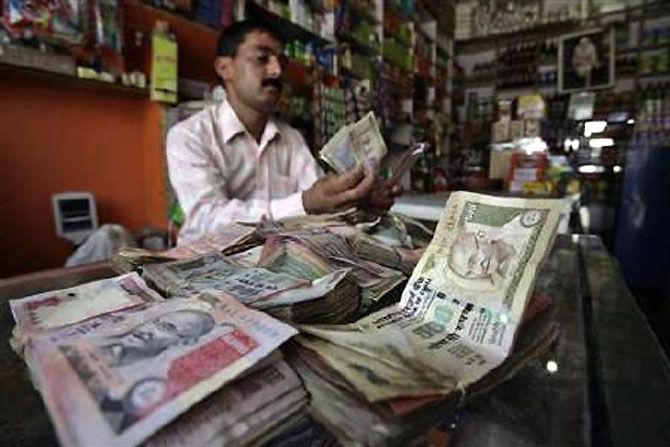Don’t waste the money on politically motivated social programmes, says T C A Srinivasa-Raghavan.
 This column perks up its ears when it encounters economic illiteracy caused by what I call the “Lemming Effect” amongst commentators.
This column perks up its ears when it encounters economic illiteracy caused by what I call the “Lemming Effect” amongst commentators.
You can also find it in Joseph Heller’s classic novel, Catch-22. (However, what I have written below from the book is not Heller’s Catch, which is different).
The hero in the book spells out his dilemma as follows: If everyone is saying the same thing, never mind how idiotic, I would be a fool, isn’t it, to say the opposite?
Thus, today, the accepted wisdom by economists, economic commentators and editorial writers is this: Reduce interest rates and reduce the fiscal deficit if you want the economy to bounce back.
The “reduce interest rates” argument is based on the belief that investment in India is sensitive to the price of money.
It forgets that when the first post-1991 investment boom happened during 1993-95, the prime rate was 18 per cent.
During the second boom 10 years later, it was over 14 per cent.
Today, it is around 10 per cent. So let's not fool ourselves.
The truth is private investment happens in India when banks are made to lend to big entrepreneurs with small stakes, who take large loans which they then siphon off.
Then they go belly up and get the loan written off with some help from politicians.
The price of money has little to do with investment when there is no intention to repay.
How can it, when 75 per cent of the banks are owned by the government and are run for the benefit politicians and political parties?
For the big borrowers, therefore, effectively the interest rate is zero - or thereabouts.
Holy Grail
Then there is the Holy Grail of the fiscal deficit. That it should be as low as possible is not the same thing as saying it should be only as low as is necessary.
I subscribe to the latter view. You can argue about this level but national necessity must be a factor in determining it.
The International Monetary Fund can’t be the arbiter, nor can foreigners who lend money to India.
I have argued so often that there is no sanctity to the three per cent level - except the “Lemming Effect” - that it is embarrassing to bring it up again. So I won’t.
Nevertheless, it is worth saying two things. One, when bank lending is going to be low for lots of other reasons, the “crowding out” argument applies only at the margins.
So even if the deficit falls to zero, the public sector banks are in no position to lend. Most of them are nearly broke.
That said, if the only reason for keeping the deficit low is that you fear international investors will avoid you if it is high, one must ask: How badly do we need foreign money since our other earnings - like from exports - are badly down?
Also, when the current account deficit is so low, way less than two per cent, one must also ask: Do we really need a lot of foreign money so badly?
If yes, why, what’s wrong? If not, why this obsession with the fiscal deficit target?
Can someone in the government explain, please?
National necessity
The other reason for increasing the fiscal deficit this year is a perfectly textbook Keynesian reason.
John Keynes said that if there is excess capacity in the system, the government must spend more to raise the level of aggregate demand in order to increase capacity utilisation. Is anyone saying there is no excess industrial capacity in India today?
It is worth reiterating: The honest consumer is unable to spend because the government takes away nearly half his income through taxes and cesses.
World demand is down, too, so exports are down. With two major components of aggregate demand down, investment demand is down too.
This is exactly the problem Keynes was tackling: flat-on-their-backs banks, and deficient consumer, investment and export demand. So who but the government is going to spend?
This is what I mean by a national necessity. In politics you have emergencies; in economics you have necessities.
The only caveat I would add is spend on just two things: half on recapitalising the banks and half on roads so that the demand for steel and cement, which are major growth drivers, increases.
Don’t waste the money on politically motivated social programmes, a la Sonia Gandhi.
If you can’t do that, stick to the three per cent target. It is the lesser of the two evils.
Union Budget: Complete Coverage











